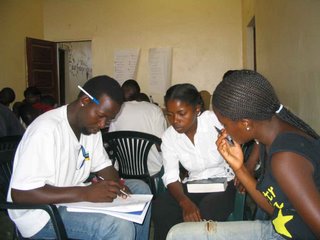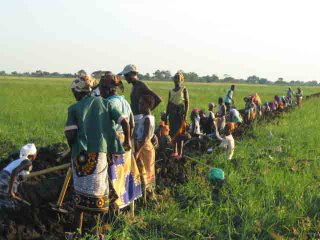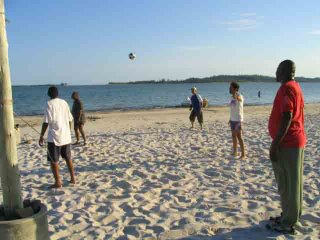Tshembeka - Faithfulness
Today my work included interviewing some folks involved with World Relief for a story that will be sent to our church partners in the U.S. I thought I'd share one story here as well.
Luisa Vilanculos, pastor of a 300 member church in Maputo (in red at right), is grateful to be a member of Tshembeka, the WR HIV/AIDS program in Mozambique. The community used to only hear about AIDS. Now they learn, they are open, they know what is dangerous and what is not. Her home and church have changed. She accompanies people for testing and supports them if it is positive. Luisa tells people, “You need to know if you’re well or not, not to live in the dark.”
Pastor Vilanculos shared that in Tshembeka they are like a family. They visit and help each other. Before Tshembeka came to their community they used to only visit believers. Now they go to any house, any religion. They have good relationships and sometimes serve as intermediaries in families. Some of the people they visit come to church now. The Tshembeka volunteers in the church care for 56 orphans and at least 60 people who are HIV positive. AIDS is increasing. Many are in denial and don’t want to be visited in their homes, but will go to other homes. Young people listen but don’t change. The pastor says, “Their spirits are dry. God needs to open their eyes.” Luisa talks about AIDS from the pulpit and tells the congregation that this is serious, it’s not a game.
Children are victims of youth and men. The rumor goes around that having sex with a virgin cures AIDS. So the church teaches their Sunday School children to be careful, and not take money from any men. The volunteers accompany them, they help them cook, clean and sometimes sleep there. Then the community knows that someone is looking after these children.
The pastor applied for a grant from the Mozambican government and it was granted for six months. With it she furnished clothes, food, school fees for orphans. She reapplied but was told she needed to have a project to make a profit for a revolving fund. They have not figured out what to do and so they are without funds once again. They have the will to help, but not the means.
* * * * * * * * * *
This is where we come in with ideas for microenterprises. Sadly, we can't reach everyone who would like a loan to get started, but we do what we can. We were very happy to learn that at least 11 chicken-raising groups have paid off their chicken house loans and are well on their way to having a sustainable business.


